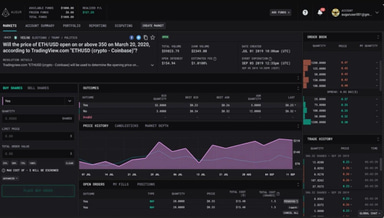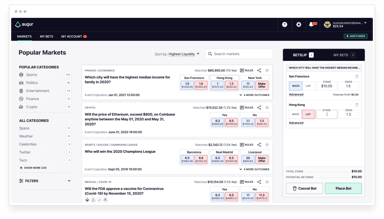Read
Edit
History
Notify
Share
Augur
Augur is a prediction market that is built as a decentralized oracle and peer-to-peer (P2P) protocol. The firm has its very own token, Reputation (REP), which is used for staking on the platform. [1][2]
Augur is a trustless, decentralized platform for prediction markets. Augur is an Ethereum-based decentralized prediction market that leverages the wisdom of the crowds to create a search engine for the future that runs on its token, REP. Augur allows users to create their markets for specific questions they may have and to profit from the trading buys while allowing users to buy positive or negative shares regarding the outcome of a future event. [3]
Markets on Augur are created by individual users of the Augur protocol, and users who do create markets using the Augur protocol must ensure they comply with all their local jurisdictional laws, rules, and regulations.[23]
After Augur v1 came Augur v2 which was launched on July 28th, 2020.[24]
History
The idea for Augur was initially conceived in 2014 by co-founders Jack Peterson, Joey Krug, and Jeremy Gardner. As described in their White paper, Peterson and Krug sought to create the first decentralized, open-source platform for prediction markets.
Augur (v1) was launched in 2018, showing great potential for blockchains to get involved in prediction markets.[4] The introduction of the combination of prediction markets and cryptocurrency came with great speculation from market regulators.[5] Additionally, the platform saw a lot of potential legal issues, with some users creating assassination markets that many feared could incentivize the real killings of celebrities and others.[6] Shortly after its launch, these potential legal issues caused the site's growth quickly declined within a few months.[7]
Its second version, known as Augur v2, was launched on Ethereum Mainnet on August 1, 2020. [8] The update introduced a scam filter that removes potentially fraudulent markets to an area that is harder for users to access. Also with the implementation of 0x open source software, Augur v2 uses free peer-to-peer bets instead of a system that charged users fees to make bets. Users can now bet DAI instead of Ether.
Jack-Peterson, Joey Krug, and Jeremy Gardner. As described in their White paper, Peterson and Krug sought to create the first decentralized, open-source platform for prediction markets.
Augur (v1) was launched in 2018, showing great potential for blockchains to get involved in prediction markets. [9] The introduction of the combination of prediction markets and crypto came with great speculation from market regulators.[10] Additionally, the platform saw a lot of potential legal issues, with some users creating assassination markets that many feared could incentivize the real killings of celebrities and others.[11] Shortly after its launch, these potential legal issues caused the site's growth quickly declined within a few months. [12]
Its second version, known as Augur v2, was launched on Ethereum Mainnet on August 1, 2020.[13] The update introduced a scam filter that removes potentially fraudulent markets to an area that is harder for users to access. Also with the implementation of 0x open source software, Augur v2 uses free peer-to-peer bets instead of a system that charged users fees to make bets. Users can now bet DAI instead of Ether. [14]
Tech
Augur is both a decentralized oracle and peer to peer protocol. [15] Its 'Oracle & Market Resolution System' was introduced with Augur v2. One of its key improvements is speed within the system. With the implementation of an oracle, the oracle can tell the blockchain what the given outcome was in a prediction, and how a market should resolve with the given outcome. [16]
Augur has two tokens on its platform: Reputation (REP) and (REPv2), which are both cryptocurrencies used by reporters during the 'market dispute phases' of the platform. Token holders put the coin towards staking on an outcome. If a user predicts the correct outcome, they receive a share of the market's settlement fees.' If the prediction is incorrect, the user loses their staked tokens. Wallets that can hold REP include Bitcoin Wallet, Citowise, Edge, Exodus, and Jaxx Liberty. [17]
Catnip
Based on Augur and Balancer, Catnip is a decentralized, open-source prediction market. Catnip uses a Balancer pool composed of Dai and wrapped outcome shares. Users of the interface can then swap any three of the cryptocurrencies against the other. The Balancer pool contract then determines the price. Those that own wrapped shares may wrap and unwrap their assets as they please. [18][19]
Services
Based on the ideas of game theory and the wisdom of the crowd, prediction markets achieve greater forecasting accuracy than any individual experts can. However, the problem with previously existing prediction markets is that they were all centralized.
Centralization has a few drawbacks in this scenario:
- Centralized platforms have single points of failure, meaning that they can be shut down relatively easily compared to a decentralized system.
- Somebody has to report the actual outcome of the events that have been bet on. In centralized markets, this requires trusting an individual to report honestly and correctly every time.
By providing a decentralized solution, Augur allows people from anywhere in the world to ask a question about the outcome of a future event and buy and sell shares on the outcome of any market they wish to participate in. Moreover, it allows thousands of users to report on outcomes, thus removing the need to trust an individual reporter.
All of the money that’s collected for a particular event is stored in a smart contract. When reporting on the event ends, the smart contract self-executes and redistributes the money appropriately based on the results.
Reputation (REPv2 Token)
REP is an ERC-20 token that operates on the Ethereum blockchain. It is used by reporters during market dispute phases of Augur. REF can also be staked by its holders to correct outcomes and receive a portion of the market's settlement fees and If they report incorrectly, they lose your REP.
It has a total supply of 11,000,000 REP and can be traded on exchanges like Binance, OKX, CoinW, CoinTiger, and AAX.[25][26]
Augur DAO
Augur aims to create a decentralized financial system, thereby creating a DAO. It has created are secur-chain oracles designed to economically secure real-world outcomes on a blockchain that has been time and trial-tested. Millions of dollars in user money have been accurately, verifiably resolved, and allocated.
The DAO is run by its community members who have been involved through all stages and multiple years of Augur’s development; they understand the ins and outs of the protocol’s history and design and demonstrate that no one is better qualified to govern the protocol than those who use it.
The DAO will be established using a DXdao Guild an is the ERC-20 governance structure. Since the REPv2 was not initially conceived of as a governance token, the DXdao Guild contracts have been customized to work with Augur’s REPv2 and have been designed to allow for upgradability that will let the DAO vote on how to follow REPv2 forks during the Augur oracle resolution process.[27]
Team
Augur has assembled an experienced team of developers, led by co-founders Jack Peterson, Joey Krug, and Jeremy Gardner. [20]
Peterson is a former National Defense Science and Engineering Graduate Fellow and holds a Ph.D. from the University of California, San Francisco. Krug is one of the 2016 Thiel Fellows, which allowed him to take a leave of absence from Pomona College to work in Augur full-time. Before joining Augur, Gardner founded the College Cryptocurrency Network. [21]
Augur additionally has several notable advisors including the founder of Ethereum, Vitalik Buterin, trading expert Ron Bernstein, economist Dr. Robin Hanson, CEO of EnlightedJoe Costello, and Lightning Network founder Elizabeth Stark, to name a few. [22]
Augur
Commit Info
Feedback
Average Rating
How was your experience?
Give this wiki a quick rating to let us know!
Twitter Timeline
Loading
Media






REFERENCES
[1]
[2]
[3]
[4]
[5]
[6]
[7]
[8]
[9]
[10]
[11]
[12]
[13]
[14]
[15]
[16]
[17]
[18]
[19]
[20]
[21]
[22]
[23]
[24]
[25]
[26]
[27]